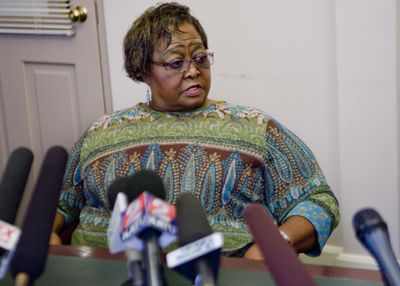Supreme Court upholds Oregon tobacco ruling

WASHINGTON – Ten years and a day after a jury awarded Mayola Williams nearly $80 million in punitive damages in her fight with a cigarette maker, the Supreme Court said Tuesday she can collect her share.
The court threw out the appeal of that award by Altria Group Inc.’s Philip Morris USA, frustrating the efforts of business interests that hoped to use this case to get the court to set constitutional limits on damages awarded by juries.
Williams, of Portland, stands to collect between $60 million and $65 million from a pot that has grown to more than $155 million because of accrued interest.
In a one-sentence order, the court left in place a ruling by the Oregon Supreme Court in favor of Williams, who sued the cigarette maker after her husband died of lung cancer. The state court has repeatedly upheld the verdict finding Philip Morris accountable for misleading people into thinking cigarettes were not dangerous or addictive.
“I don’t know exactly how I feel,” Williams said at a news conference in Portland.
“I know you people want to hear I am joyful and excited about this because of the money that is involved, but that is not the case,” said Williams, whose husband died 12 years ago.
The justices heard arguments in the case in December. On Tuesday, with no explanation, justices said they are not passing judgment on the legal issues that were presented. Instead, it is as if the court had declined to hear the case at all.
Philip Morris had argued that the award should be thrown out and a new trial ordered because of flaws in the instructions given jurors before their deliberations.
Business interests had once hoped the high court would use the case to set firm limits on the award of punitive damages, intended to punish a defendant for its behavior and deter a repeat offense.
The court’s decision was a surprising and anticlimactic ending to a case that has bounded back and forth through the judicial system for nearly a decade. When an Oregon jury awarded Williams nearly $80 million following the death of her husband, Jesse, it was the largest award of its kind.
Even though the justices have strongly implied that the award was too large and twice sent the case back west, the Oregon Supreme Court found reasons to leave it as it was. After the Oregon justices declined to change its decision for a second time, lawyers for Philip Morris petitioned the high court to “vindicate” its authority.
Instead, the court Tuesday said it should not have accepted the case for a third time, and in the language of the court, dismissed the case as “improvidently granted.”
Because the case was argued in early December and the court issued its decision only today, it suggests the justices had trouble coming together on how to solve the legal issues raised.
Because the court itself said nothing about the case Tuesday, it is hard to read much into the decision, said experts on both sides of the case.
Murray Garnick, Altria’s associate general counsel, expressed disappointment with the ruling, but said the decision does not undo earlier high court rulings reining in punitive damages awards. “While we had hoped for a different outcome, the Supreme Court has decided not to review a narrow procedural ruling by the state court,” Garnick said.
Robert Peck, Williams’ Washington-based lawyer, read the outcome differently. He said the court has signaled a willingness to allow large awards in certain circumstances. “I think we can take from this long tale that if the behavior is sufficiently reprehensible, then larger awards are merited,” Peck said.
The case developed from the death of Jesse Williams, a janitor in Portland who started smoking during a 1950s Army hitch. He died in 1997, six months after he was diagnosed with lung cancer.
Mayola Williams first won a judgment on March 30, 1999, in the claims of fraud she pursued on behalf of her late husband. She was awarded $800,000 in actual damages. The punitive damages are about 97 times greater. A state court previously cut the compensatory award to $521,000.
The original $79.5 million punitive damages verdict grew at a rate of 9 percent a year because of interest authorized by Oregon law. Sixty percent of the total is supposed to go to an Oregon crime victims fund, although the company said Tuesday it plans to contest the portion owed the state.
Williams’ son, Glenn, said the marathon battle against Philip Morris began with his father’s wish, and his mother’s decision to follow through on a promise she made to her husband to hold Philip Morris accountable.
“This is for my father. This is what he wanted,” Glenn Williams said. “Today has been surreal for us.”